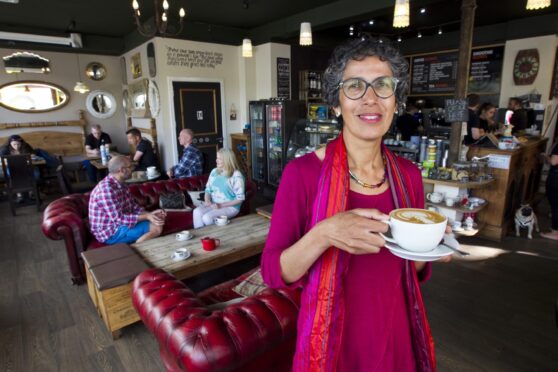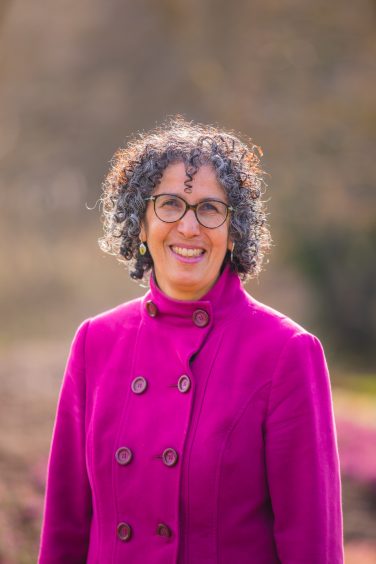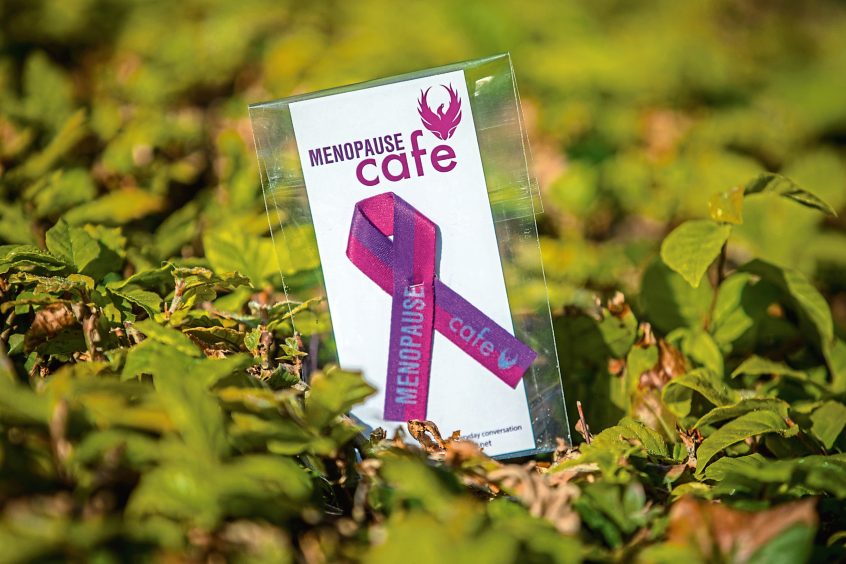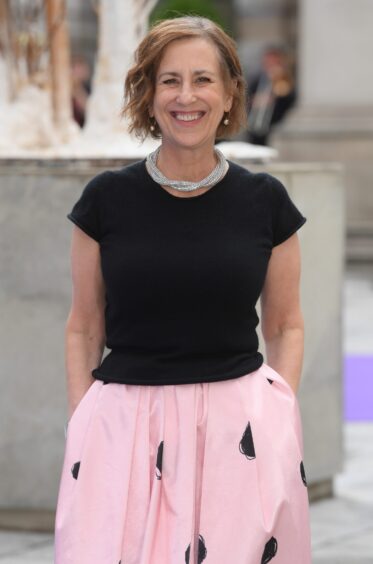
It’s a simple little symbol, but a new Menopause Ribbon being distributed in workplaces across the country could end up helping to spark crucial conversations that are often hard to start.
The awareness campaign is the latest bid by the Menopause Cafe charity, founded in Perth by Rachel Weiss in 2017, to bring people together and encourage discussion across ages and genders.
It builds on the success of the cafe events, now replicated around the world from the UK to Kenya, Canada, Australia and more, where a coffee and a chat have helped unlock greater confidence in bringing up issues, especially in the workplace.
“The idea behind it is to reduce the stigma and shame that still sadly affects people who are going through the menopause,” Rachel explained.
“It’s come on leaps and bounds since we started the charity in 2017, every other celebrity is sharing their story and it is talked about in workplaces.
“But the people who attend our cafes are still embarrassed to talk to their managers, particularly if it’s, say, a male in their 30s and neither of them have possibly said the word menopause before.
“You can imagine how awkward that conversation is – a bit like it was telling your boss you were pregnant back in the 50s or 60s. We’re absolutely fine with pregnancy now and I would like menopause to be the same.”
Research by the Fawcett Society found that one in 10 women surveyed who were employed during the menopause left work due to their symptoms.
And it can often be a struggle to begin the conversation about reasonable adaptations that could be made to make working life easier without fear of exposing perceived weakness or unsuitability to continue in the same role.
“You would not believe the amount of shame and fear that working women, particularly in their 40s and 50s, have when they suddenly get hit by forgetting stuff or hot flushes or anxiety,” Rachel said. “They’re terrified to talk about it.
“They’re expecting to be laughed at because historically menopause has been the stock of comedy rather than actually being a serious thing that affects some people horrifically.
“I think especially men wearing the ribbon just sends out so many good, accepting signals.”
Just like her cafe model is open to all, Rachel believes conversations about the menopause and hormonal changes should be had in the same way that puberty and pregnancy are talked about.
She said: “Younger people need to know about it I think just to prepare us, like we get told about puberty.
“Knowledge is power. As long as it doesn’t scare us, why not know about it?
“If you don’t know that’s going to happen then, like me, you might think there’s something wrong with you.
“I really wish I’d known before it happened to me that it’s perfectly normal in your 40s or 50s that hormones go a bit haywire, your body might start changing in bizarre ways, or your brain and feelings might.
“There are ways around all of these symptoms, but we can only access those and share tips if we’re prepared to talk about it and without the scaremongering.
“People who will never experience menopause but who live and work with and love people who will go through the menopause need to be there too.
“Just like everyone needs to know about pregnancy… it’s just a basic general knowledge.”
And, of course, those who have been through it all have a vital perspective to share.
“It’s very important that postmenopausal people are included in this conversation because they give us hope,” Rachel added.
“It’d be like if you only ever spoke to people in puberty and never spoke to mature men and women. You just get the bad side. It’s essential that postmenopausal people come to these cafes to show us it’s not all bad and there are some silver linings when you come out the other side.”
Being a part of the Menopause Cafe project, Rachel says, has helped her in her own journey too.
“When I set these up, I didn’t even realise I was perimenopausal,” she said.
“I’ve learned so much from listening to women. I’ve learned that my irregular, heavier period and forgetting things were probably a sign that I was in perimenopause. I hadn’t even heard of that word before.
“There’s lots of good information on websites and books, but there’s something about listening to people’s stories. I think that’s just a natural way for us to learn.
“It took years before I realised I probably should start exercising and running because our bone density gets worse in the menopause. I had to hear that several times at cafes before I did my Couch to 5K!”
The ultimate mission of the Menopause Cafe is to get to the point where conversations are so normalised it has become redundant.
So how far along that journey does Rachel think they are?
“We are moving in the right direction,” she said. “There’s a long way to go. I think it may partly be a generational thing.
“My kids are in their 20s, that generation seem to talk about menstruation far more easily. I’m in my late 50s, so my generation and those before me grew up learning that we should hide our menstrual pads and tampons up our sleeves so that the boys didn’t see it.
“We carry a lot of shame about menstruation and hence about menopause. We also carry a lot of shame about becoming older women and I’m less confident that that will change.
“It’s so ingrained that we should want to be younger and this means that when a woman has her menopause, and women at the cafes say this, they can’t tell their boss because then he’ll think they’re an old woman.
“We’re up against gendered ageism in society, and that is not going to shift for a long time in western culture.”
A simple idea that makes a big difference
The Menopause Cafe model was partly inspired by the BBC documentary The Menopause And Me fronted by Kirsty Wark, who is now a charity patron.
It also drew from Rachel’s work with Death Cafes, gatherings that allowed people to open up about mortality.
Alongside Gail Jack and Lorna Fotheringham, the first Menopause Cafe was held in Perth in 2017 with over 30 people attending.
Through word of mouth the model began to spread and there are now cafes worldwide.
“I’m delighted because we sat there in Blend Coffee Lounge in Perth wondering if anyone would turn up,” Rachel said.
“I do think if we’d done it even five years earlier, it might have just sunk like a stone in the water. I think it was the right time and the right country – Scotland is ahead of the game on menopause.
“At the moment it’s like an incubation. People come to the cafe to practice talking menopause in a safe, accepting, non-judgmental environment.”
Going to the cafes has proved vital for those struggling to get by, letting them know they are not alone in facing it.
“We’ve had suicidal people tell us this is helpful,” Rachel said. “It is serious stuff at the extreme end of the scale.
“We’ve had people at cafes in the UK who’ve said they were suicidal and but can now see light at the end of the tunnel because they’ve spoken to other people and know they’re not alone.
“Because of my background as a counsellor, I know that being accepted and speaking in a conducive environment makes all the difference to people.
“The simple model means it travels easily. You don’t need to know the first thing about menopause to host a cafe. You just need to know how to facilitate a group.
“We can’t change people’s menopause symptoms and troubles, but I’m touched that something so simple makes such a difference.”
Find out more about the Menopause Cafe charity at menopausecafe.net

Enjoy the convenience of having The Sunday Post delivered as a digital ePaper straight to your smartphone, tablet or computer.
Subscribe for only £5.49 a month and enjoy all the benefits of the printed paper as a digital replica.
Subscribe © Steve MacDougall / DCT Media
© Steve MacDougall / DCT Media © Steve MacDougall / DC Thomson &
© Steve MacDougall / DC Thomson & © David Fisher/Shutterstock
© David Fisher/Shutterstock